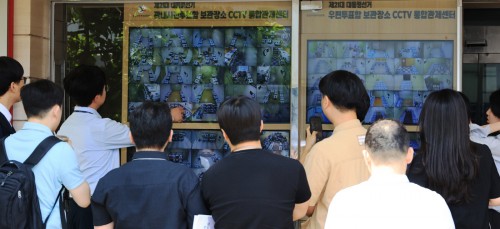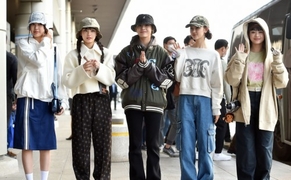 |
| Observers view surveillance footage of storage areas for early voting and mail-in ballot boxes for the 21st presidential election at the Seoul Metropolitan Election Commission in Jongno District, Seoul, on June 1. / Source: Yonhap News |
With the presidential election set for June 3, early voting held on May 29 and 30 closed with a turnout of 34.7 percent. One in three voters has already cast their ballot and is now awaiting the outcome. In response, each campaign camp is analyzing the implications of the turnout figures and adjusting its final strategy accordingly.
Reactions from political circles on June 1 were mixed. Initially, with heightened public interest following recent political turmoil—including the imposition of martial law and an impeachment crisis—many had expected a record-breaking turnout. While the first day of early voting saw a historic high of 19.5 percent, the final figure ultimately fell short of the previous presidential election’s 36.93 percent by 2.19 percentage points.
The Democratic Party of Korea (DPK) publicly maintained it had “no target figure” for early voting, but internally viewed a 40 percent turnout as a key threshold for victory. The party had aggressively encouraged participation, anticipating that public anger toward the Yoon administration would drive voters to the polls. When turnout surged on May 29, some in the party were buoyed, with talk of a potential governing victory “just four days away.”
However, caution also prevailed. Jeon Joon-ho, head of strategy for the DPK’s campaign, stressed that “early voting turnout alone cannot be interpreted as advantageous for any particular candidate.” Party officials feared that overconfidence could be perceived as arrogance, potentially galvanizing centrist and conservative voters. One DPK insider warned, “There may be various interpretations of the turnout, but we must avoid the appearance of celebrating prematurely.”
The ruling People Power Party (PPP), meanwhile, is banking on a “silent conservative” surge. The party expects recent controversies surrounding alleged proxy voting and ballot mishandling by the National Election Commission to drive conservative voters to turn out strongly on June 3. Lee Jung-hyun, co-chair of the PPP’s campaign, said, “The NEC’s management failures have angered conservative voters, fueling their determination to vote on election day. Signs of a dramatic turnaround are emerging.”
To this end, the PPP has launched an all-out effort to mobilize its base for the final vote. Candidate Kim Moon-soo is focusing his late-stage campaign on the capital region, where early voting turnout lagged. Turnout in traditionally swing areas such as Seoul (34.28%), Gyeonggi Province (32.88%), and Incheon (32.79%) fell below the national average.
Regional variations in turnout also reflected political leanings. The DPK stronghold of South Jeolla Province recorded the highest turnout at 56.5 percent, while Daegu, a PPP stronghold, posted the lowest at 25.63 percent. One political observer noted, “The regional disparities in early voting turnout present a clear challenge. The next two days will be a battle over which side can better mobilize its supporters.”
Most Read
-
1
-
2
-
3
-
4
-
5
-
6
-
7





















